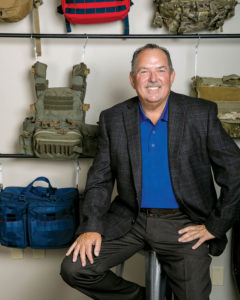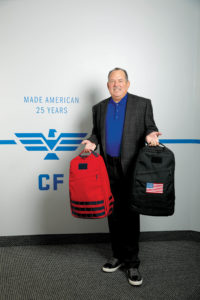
One of the keys to our success is our investment in advanced automated equipment,” says Don Alhanati, founder and president of CustomFab USA in Garden Grove, Calif. “That, and the fact that we have a creative staff. We are always looking at ways to do things smarter.”
Alhanati had worked 12 years at a manufacturing company that produced turbochargers when, in 1988, his friend convinced him to start their own business fabricating hook-and-loop straps. After two years the company folded, and Alhanati set out on his own. “I went out and found an ultrasonic welder, a sewing machine and a strip cutter, set them up in my garage and started selling hook-and-loop straps to medical companies,” he says.
Growth was slow but steady for CustomFab USA, and Alhanati built a customer base by attending medical trade shows. He soon added employees, and in less than a year moved out of his garage to a 1,200-square-foot building in Torrance, Calif. “I wouldn’t say it was easy, but it was amazing how many people at the trade shows were receptive and wanted help,” he says. “It seemed like so many of them were not happy with their suppliers at that time.”
The main complaints Alhanati heard about suppliers had to do with late deliveries, something he was determined would not be an issue for his company. “It was ingrained in me that in manufacturing, if you’re short one component, you can’t build something. If you’re short even one screw, you can’t complete the product,” he says. “Although we now also make sole items such as backpacks and luggage, at the time we primarily made straps and other items that were used as components in other products. I knew that being on time with deliveries was vitally important to our clients so they could make their products. So we made sure we were on time, whether that meant adding people or adding hours.”
Tactical moves
 Soon the company was experiencing increased growth and moved from its Torrance location to Huntington Beach, Calif., first to a 3,000-square-foot facility, then to one with 6,000 square feet, then 14,000, followed by 44,000, and finally to where it’s located today, with 77,000 square feet of space. CustomFab currently has more than 300 employees, including several family members—his son Brian is vice president, his daughter Rhonda is customer service manager and his brother Joe is purchasing manager. Another brother, Howard (now retired), was in sales. “Brian is my right-hand man and has been with the company 20 years,” Alhanati says. “He’s vitally important to what we do, especially when it comes to researching and implementing new technologies, as well as being my key sales person.”
Soon the company was experiencing increased growth and moved from its Torrance location to Huntington Beach, Calif., first to a 3,000-square-foot facility, then to one with 6,000 square feet, then 14,000, followed by 44,000, and finally to where it’s located today, with 77,000 square feet of space. CustomFab currently has more than 300 employees, including several family members—his son Brian is vice president, his daughter Rhonda is customer service manager and his brother Joe is purchasing manager. Another brother, Howard (now retired), was in sales. “Brian is my right-hand man and has been with the company 20 years,” Alhanati says. “He’s vitally important to what we do, especially when it comes to researching and implementing new technologies, as well as being my key sales person.”
As the company grew, so did its product offerings. A turning point came approximately 20 years ago when Alhanati began making military tactical gear. “Doing that forced us to invest in automated equipment,” he says. “That was big for us, because now we’ve adapted so many of our products to computerized sewing—increasing both efficiency and quality. Anything we put on those machines is going to be more consistent.”
Currently the company serves a variety of industries, including medical, military, luggage, aerospace and sporting goods. The growth it has achieved wasn’t without its challenges. “Managing that kind of growth hasn’t been easy, that’s for sure,” Alhanati says. “But it’s helped to have a lot of people who have been here for a long time. Our first employee is still an employee and our first customer is a still a customer. Keeping key people who are knowledgeable about the products we make is instrumental in our consistent quality.”
Tracking quality
Producing quality products also relies on a strong quality control (QC) department, which is instrumental in keeping to ISO 9000 standards, Alhanati says. “It starts with making our operators responsible for quality,” he says. “Then QC does random quality tests, inline inspections and final inspections. It’s what keeps bringing our customers back.”
Alhanati credits the company’s customized Enterprise Resource Planning (ERP) accounting and managing software for its efficiency and ability to meet orders on time. “The system handles material allocation, which drives our purchasing department as well as production scheduling,” he says. “A good ERP system like ours is always running in the background so our demands are in real time.”
Managing the system saves time in the end, but to do that it takes a dedicated staff to consistently enter information into the system on the front end. “It’s an intelligent and integrated system, which is what a big company like ours needs,” Alhanati says. “Some of our bills of materials have 200-plus line items, and last year we made more than 2,000 unique SKUs, so it’s important to stay committed to using the software.”
Strength through diversity
Some of what makes the CustomFab process so wide-reaching is the diversity of products the company regularly manufactures. “One of our big strengths is our diversity across different markets,” Alhanati says. “We try not to rely too heavily on one market over another, which helps to make us more stable.”
Being in so many different markets and manufacturing so many different SKUs and product types creates challenges when it comes to manufacturing techniques, production line configurations and compensating employees based on productivity. To solve this challenge, the company has dedicated production lines for the products that it makes every day. For products that aren’t as consistent, the company has built flexible production cells that are reconfigured as demands change. “We utilize continuous improvement events to apply lean principles,” Alhanati says. “For the rest of the departments, we make sure tools are organized and handy, and that similar items are manufactured together in the production areas.”
Recently a very large business in an altogether different market segment approached Alhanati to manufacture its products, under an exclusivity and nondisclosure agreement. The client needed someone who could deliver large volumes with consistently high quality. It was a commitment that required CustomFab to invest heavily in custom-made equipment, including an extremely large sewing machine. “Our willingness to go the extra mile and create a machine that didn’t even exist yet is what we’re known for,” he says. “There’s always new challenges on the horizon, and our ability to overcome them is what has helped us get to where we are today, fueling our continued growth and success.”
Sigrid Tornquist is a writer and editor based in Minneapolis, Minn., and a regular contributor to the Review.
 When professional golf club cover and travel bag giant Club Glove wanted help to design and produce the T.R.S. ballistic luggage line, it reached out to CustomFab USA to make it happen. The collaboration was a success, and CustomFab USA now manufactures the T.R.S line, as well as Club Glove’s entire line of golf and travel gear—the number one luggage line on the professional golf tour. “We often work hand-in-hand with customers, combining our technology with the latest advancements in fabrics to bring their unique visions to life,” says Don Alhanati, founder and president of CustomFab USA.
When professional golf club cover and travel bag giant Club Glove wanted help to design and produce the T.R.S. ballistic luggage line, it reached out to CustomFab USA to make it happen. The collaboration was a success, and CustomFab USA now manufactures the T.R.S line, as well as Club Glove’s entire line of golf and travel gear—the number one luggage line on the professional golf tour. “We often work hand-in-hand with customers, combining our technology with the latest advancements in fabrics to bring their unique visions to life,” says Don Alhanati, founder and president of CustomFab USA.
The T.R.S. ballistic luggage line is constructed with Invista™ Cordura® 1050 denier ballistic nylon fabric and features inline skate wheels and patented base; and a patented train reaction strap to connect to luggage.
Have you ever considered moving production offshore?
Over the last 27 years I have resisted the temptation of setting up manufacturing in another country. All of our manufacturing is here in our Garden Grove facility. And we are interested in seeing more and more reshoring. We’ve seen growth, and we get quite a few requests for “Made in the U.S.A.”
Are you seeing customers willing to pay more for products made in the U.S.A.?
To a degree. But price is usually an important issue for inquiring customers. Utilizing all our technologies and automation to stay as competitive as possible is core to what we do.
 TEXTILES.ORG
TEXTILES.ORG


